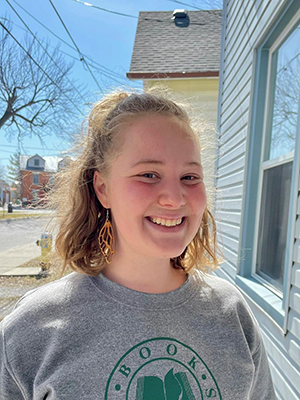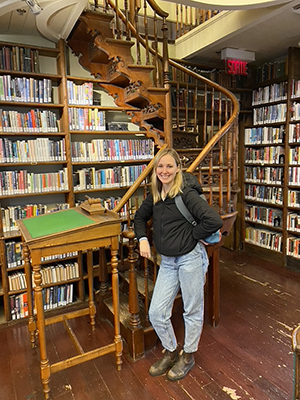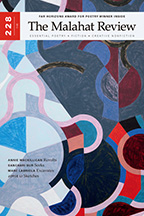Untangling/Retangling: Molly Pearce interviews Tazi Rodrigues

Screener Molly Pearce talks with Tazi Rodrigues, whose poems “family traditions” and “vermicomposting” appear in our spring issue #226. They discuss the myth of art vs. science, writing as a way to both think and communicate, and seeking community in the arts.
Read “vermicomposting” here.
Tazi Rodrigues (she/her) is a writer and biologist who studies movement and (mostly) fresh water in both disciplines. A second-generation settler from Treaty 1 territory, she lives in Ottawa on the unceded land of the Anishinaabe Algonquin Nation. She placed second in the 2023 Kloppenburg Hybrid Grain Contest for her essay on learning Portuguese and listening to fish, and her lighthouse-island chapbook, I Followed the Coasts, was published by JackPine Press in 2021. Other writing has appeared in The Fiddlehead, CV2, and Canthius. She is currently writing about ecological sound, caring for the worms and foster cats who live with her, and looking for good places to swim.
Your poems “family traditions” and “vermicomposting” present a loving relationship with the worms in your life—a refreshing perspective on underappreciated creatures! Does your fondness for and understanding of the worms predate your poetry, or did composing these poems allow you the space and focus to nurture your appreciation for them?
The worms came marginally before the poems—though as “family traditions” discusses, perhaps not that marginally after all. I moved to Ottawa last fall and one of the first things I did here was attend a vermicomposting workshop, which alerted me to the huge number of worms in this city, driven at least in part by a local business that makes beautiful worm studios and advocates tirelessly for soil-building. At first I just wanted a reasonable approach to home composting in an apartment, but I wrote the first lines of “vermicomposting” within a day of the worms moving in and have since written at least four more worm poems. They have let me worm into some unexpected and (or) tricky subjects, because the creatures live in so many different contexts, but they are also just a comforting, routine part of my life now so they inevitably end up in my writing.
These poems seem to encourage readers to invite the wild closer into our domesticated lives, which are too often very separate from nature. What do you think a closer relationship with our environment brings to our lives? I wonder if you might speak more to your motivation for sharing these ideas with your readers.
I don’t think I have a very satisfying answer to this question, because relationships with environments—particularly the other biotic parts of environments—are fairly all-consuming for me, so it emerges in my writing less from identifiable motivations and more from how I interact with the world. My main goal in life is to be in water or in soil as often as possible, and when I’m not, I’m usually writing and thinking about it. Over the past couple of years quite a lot of my writing has been about aquatic animals I’ve met working on lakes near Kenora, so jumping to worms in my apartment was an easy progression.
That being said, I will take the opportunity to say that urban landscapes and homes are not thought about in terms of biodiversity as often as they could be, and I think it’s important to spend time with the soil and creatures in and around our homes wherever they are. Environmental writing, too, has often turned to ideas of “nature” that are actively colonial, including by ignoring ongoing, intergenerational relationships between people and their environments. As a settler writer, I have a responsibility to keep this tradition in mind and to actively work against it, which will be a lifelong task of learning. So I think that in general, relationships with the environment are a non-negotiable part of my writing and my life, but from that starting point these relationships are in constant renegotiation.
In your bio, you mention that you are both a writer and a student of biology, and that you work with movement and fresh water in both disciplines. Do you find that you are able to bring these fields together to make new discoveries in either (or both) discipline(s)? What are your thoughts on STEAM (Science, Technology, Engineering, Arts, and Mathematics) as a framework for studying the environment through both science and literature?
I’m no longer formally a student of biology, though I am still a student of fish, and I am very lucky to have been working on very similar research to my master’s thesis since graduating. Poetry and science are the same, and the longer I stay in both of these fields, the clearer this becomes to me. At least in the ways in which I interact with both disciplines, they involve wondering, untangling/retangling questions, and writing as a way to both think and communicate.
My work as a biologist has a very clear impact on my poetry: last year I had a poem in Grain about collecting stomach contents from a live fish, which I probably wouldn’t have done or written about if I had a different job. The effect of poetry on my science is subtler, but I think that it has contributed to how I pay attention to my environment, and processing experiences through both science and poetry helps me deepen my understanding of them. Also, between the two of them, I am constantly working with words when I’m not in the field—whether writing or reading, computer scripts or human languages—which definitely feeds back into itself.
As a young writer, do you have any advice for other young people who’d like to develop their interests and talents as poets?
In my last semester of undergrad, I took an intro to creative writing course with Sarah Wolfson, which is where I learned (how) to revise even though I’d been writing for over a decade by then. So that would be my advice on a craft level: to stretch and crack and open poems after their first draft. The advice I’m trying to give myself right now is to attend arts events and talk to people there, despite being very shy, because being part of a community of writers and other artists is quite fulfilling for me creatively and personally. Also, do not let people tell you that the world is divided into science vs art/scientists vs artists! It's definitely possible—and not even that uncommon—to pursue both.
This also seems like a good place to say that I have read many of these interviews, and I appreciate the chance to participate! Thank you, Molly, for taking the time to think about my poems and ask these questions. When I am too shy to connect with other writers in person, or when I’m living in places or contexts with less opportunity to do so, reading reviews and interviews is a helpful way to at least observe how other people interact with art—so I would recommend that as well (though not specifically this one!).
What sorts of poems or modes of storytelling are you excited about right now?
This spring and early summer is an incredible time in publishing and I am so excited for an unruly number of books that are coming out or have recently come out, including Scientific Marvel by Chimwemwe Undi (who is one of the reasons I got very interested in poetry) and Fungal: Foraging in the Urban Forest by Ariel Gordon (who is one of the reasons I have ever written an essay).
In my own writing, I’m working on a mostly-poetry collection that centres on sound as both an ecological subject and method, as well as on trying to figure out how to write essays more consistently than once every two years. For better or for worse, my current strategy for that is to write increasingly hybrid works potentially until they are no longer recognizable as essays but are bigger containers than poems for working out some ideas, inspired by the incredible form-warping work in many lit mags right now. I am also looking forward to meeting some outdoor worms in the pollinator garden in my neighbourhood and getting to know Ottawa in the summer, both as a writer and in general.

Molly Pearce









